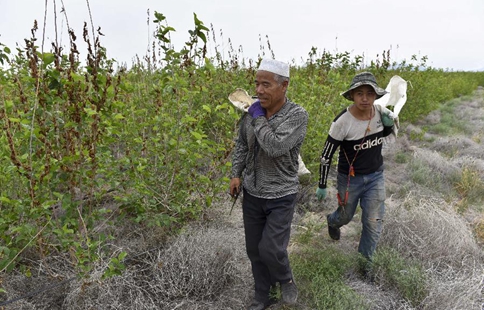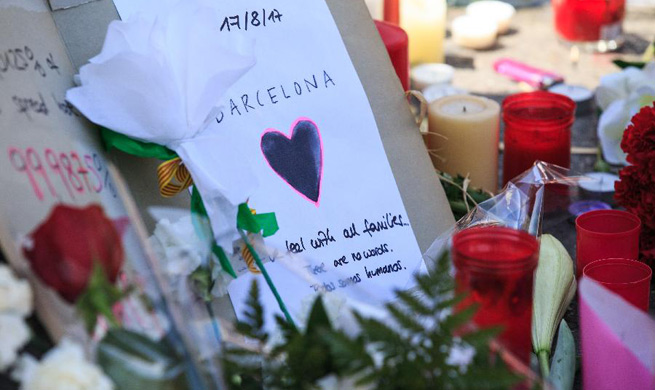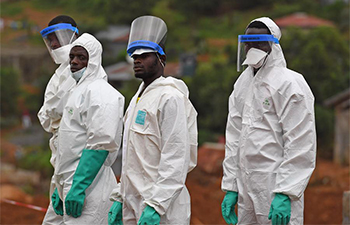ROME, Aug. 19 (Xinhua) -- Italy is on security alert Saturday in the wake of Spain's double terror attacks that left at least 14 people dead, including three Italian nationals.
Embassies, airports, churches, and tourist destinations are among the possible targets, and are under police and army surveillance in Italy after the so-called Islamic State (IS) terrorist group claimed responsibility for the attacks in the Spanish cities of Barcelona and Cambrils, which also injured about 126 people of 34 different nationalities.
Thirteen people were killed on Thursday afternoon in the popular Las Ramblas area of Barcelona when a white van zigzagged at high speed down the busy avenue thronged with tourists, knocking down pedestrians.
On early Friday morning, the fourteenth victim, a woman, was stabbed when five people jumped out of a car and began attacking people at random on the seaside promenade in Cambrils, a town south of Barcelona. Spanish police gunned down all five attackers. The woman died at hospital later on Friday. Six others were also injured in the attack.
As Italian officials held strategy meetings and leaders issued messages of condolences to Spain and to the victims' families, pundits and experts analyzed the attacks.
"In the perverse narrative of IS, Spain exerts a historical call due to seven centuries of Muslim domination, coupled with the creation of conditions in the soft belly of Barcelona which allowed the attack to take place," Paolo Magri told Italian public broadcaster RAI in an interview.
Magri is director of an Italian think tank -- Institute for International Political Studies (ISPI).
Author and journalist Zouhir Louassini, a visiting professor from Granada University in Spain, said in a televised interview that "Spain and the Catalonia region (where Barcelona and Cambrils are located) are a hot zone, as shown by an increase in the arrests of terrorist cells there in the past three to four years".
Louassini added that IS has reached a "level of madness" in its rhetoric, proving it is in trouble following its defeat on the ground in its Iraqi stronghold of Mosul.
"They have reached a point where they are urging people to do anything at all, to kill by any means, even a knife," Louassini said, even as news emerged on Friday afternoon of two deadly knife attacks, one in the Finnish city of Turku and the other in the German city of Wuppertal.
Also speaking in an interview on RAI public TV, Associate Professor of International Relations at the Pisa-based Sant'Anna School of Advanced Studies, Francesco Strazzari, said that "in this case we see a cell of 12 people, four of them being sought by police -- it is something certainly more highly organized than what we've seen in other European cities in the past few months."
Retired Air Force General Leonardo Tricarico, who is now the president of the Intelligence Culture and Strategic Analysis (ICSA) Foundation, told RAI that Europe will remain at risk as long as its leaders don't cooperate to fight fundamentalist terrorism together.
Italy, according to Tricarico, has so far been spared and this is down to a combination of anti-terrorism know-how accumulated during years of fighting domestic terrorism, and of capable leadership.
"What is missing is international collaboration, which is still in a very precocious phase," said the Italian general, comparing it to "a tiny mouse, which will have to give birth to an elephant sooner or later".
The perpetrators of the terrorist attacks in Europe are of two kinds -- home-grown individuals who become radicalized, and returning foreign fighters, or Europeans who come home after fighting in the ranks of IS in Iraq and Syria.
Since 2011, at least 30,000 foreign fighters reached Iraq and Syria from over 100 countries, of which one-fifth came from Western Europe, ISPI said in an August 4 report.
"In the old continent, the most significant national contingents are those from France (at least 1,700 individuals), Germany and Britain (about 1,000 each), and Belgium (at least 470)," the ISPI report said.
"In comparison, Italy has an estimated 125 foreign fighters, equal to two individuals per one million inhabitants, against over 40 per million in Belgium," according to ISPI.
The foreign fighter data is important because 45 percent of the 42 terrorist attacks planned in Western Europe beginning in 2014 -- the year IS declared a so-called "caliphate" in Iraq and Syria -- saw the participation of at least one returning foreign fighter.
Although the caliphate is close to being defeated on the ground in Iraq, where Iraqi and U.S. troops re-conquered the city of Mosul after a nine-month offensive, this does not mean that IS-style jihadism is over, ISPI analysts said.
"The end of the territorial character of IS does not coincide with its end as a jihadist entity," according to ISPI.
The report pointed out that "in areas where IS has been defeated militarily, in Iraq but also in Syria and Libya, the group is still active and able to carry out insurrectional or terrorist attacks".
On a global level the group is still able to operate, both in terms of "strict terrorist acts" in Europe thanks to returning foreign fighters or radicalized Europeans, and in terms of "more complex actions such as the case of Marawi in the Philippines and the attack on the Iranian parliament in June", ISPI wrote.

















